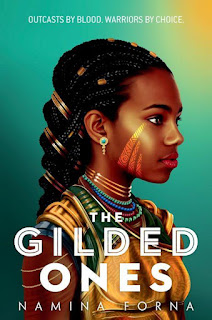From the prison where she is being held, a stranger rescues her. The stranger won't give her name, but Deka takes to calling her "White Hands" and the name sticks. Deka is taken to a training camp where she meets other "impure" girls. They are called the alaki and are condemned as abominations and demons by men. But they are also super strong and incapable of easily being killed and so feared as well. This combination of revulsion and fear permeates the rest of the novel as Deka and her sisterhood of aleki are trained by White Hands and other women to help rid their lands of even more fearsome demons called "deathshrieks."
The training and preparations for a final battle of men and the despised (and indispensable) aleki against their shared foe becomes complicated as Deka starts to develop strange powers. As she learns to master these powers, she becomes simultaneously more knowledgeable of the deathshrieks. In the end, she comes to understand that she is fighting for the wrong cause.
This rich tale of female empowerment has a surprisingly upbeat ending, but the story doesn't start out that way. It's a pretty grisly tale full of gore and violence. Female endangerment features prominently throughout the story. I would hesitate to accuse it of being gratuitous since the violence itself is integral to the story, but the sheer mass of it may turn some readers off. It's that brutality that has probably earned Forna the moniker of being "the Toni Morrison of fantasy YA." The drama itself, covering the damage of patriarchal misogyny and the damage it has wrought is hardly new material, but her treatment of PTSD in its victims is a a rarity.
I actually had a different issue with the book. Forna does a poor job of allowing her story to unfold. Instead, major plot developments appear out of thin air as important details are simply dropped into the story, unconnected to anything that occurred prior. Much of the drama of the story relies on the late introductions. Still, despite its flaw, the novel is an immersive and easy read.
If you want more, the novel's sequel, The Merciless Ones will be released on Tuesday.


No comments:
Post a Comment